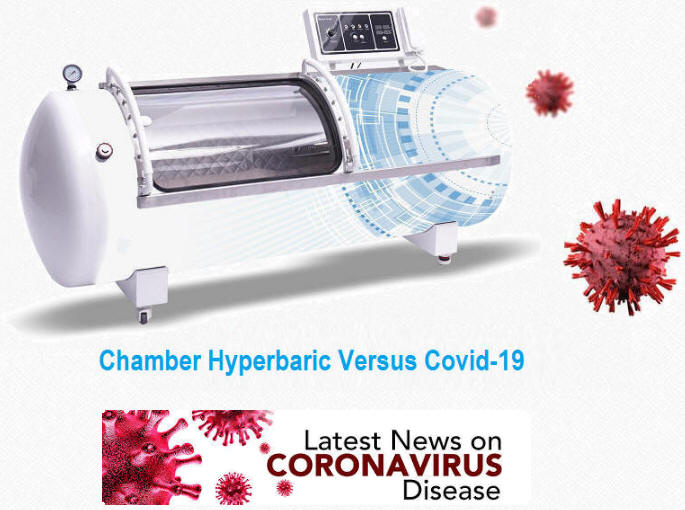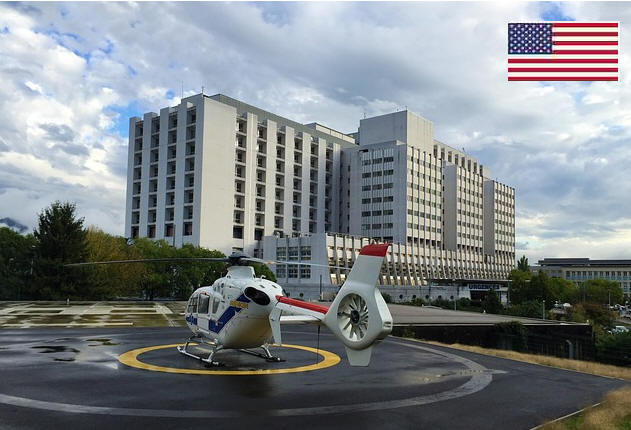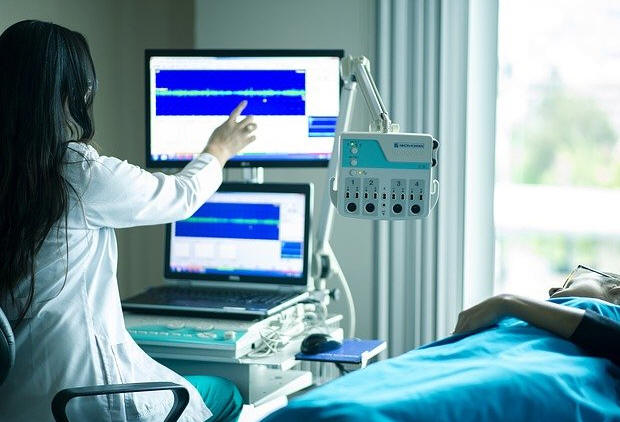OXYGEN (O2) VESUS COVID-19

By allowing the diffusion of a higher concentration of oxygen to hypoxic (oxygen starved) organs, HBOT successfully treats lung trauma and pneumonia. Reduces and destroys cytokines and interleukin 6 molecules that fuel the inflammation responsible for respiratory failure. Hemoglobin blood cells are completely filled with oxygen molecules (4 molecules can bind to each blood cell). This accelerated oxygenation effectively transports vital repair materials, such as fibronectin and proteoglycan, to reach areas of damage and accelerate the restoration process

PROVEN EFFECTIVENESS OF HBOT (hyperbaric oxygen therapy)
IN TREATING COVID-19
Clinical trials categorically show that HBOT (hyperbaric
oxygen therapy) stops viral progression and COVID-19
pneumonia, rejuvenates hypoxic organs, and speeds up the
body's natural healing process.
The unsurpassed success of HBOT remains, by and large,
unpublished. In the emergency context of COVID-19, the
pharmaceutical industry is licensed to test numerous drugs
without formal experimentation, despite an increase in
harmful side effects and deaths, in the race to patent a
lucrative drug cure.
In contrast, hyperbaric oxygen therapy is a
well-established, drug-free, and non-invasive treatment. It
has been officially recognized and classified by the World
Health Organization as a treatment for COVID, and is
approved by the FDA for a number of respiratory disorders
and tissue ailments associated with COVID-19.

During the current pandemic, several
hospitals from United States to the China have been using
hyperbaric oxygen therapy (HBOT) to treat dozens of
seriously ill COVID-19 patients with pneumonia and severe
respiratory distress, in addition to multiple high-risk
factors ( for COVID mortality), such as obesity, diabetes,
heart disease and hypertension. The result? After a short
cycle of HBOT, patients have consistently made a quick and
full recovery.
Referring to the historic success of HBOT for lung
diseases and viruses, the United States National Institute
of Medicine and Health cites: "The concept of using
respiratory gases at ambient pressures in the treatment of
disease dates back three centuries. In 1662 the Hyperbaric
air was used by Henshaw (UK) for the treatment of lung
afflictions.
In 1834, Junod (France), treated a wide variety of
ailments, including cardiovascular and pulmonary diseases,
carcinomas and diabetic feet at pressures between 2 and 4
absolute atmospheres.
In the early 1900s, Orval J Cunningham (USA) observed that people with heart disease and other circulatory disorders became ill at altitude and improved at sea level forming the basis for their use of hyperbaric air.
From 1918 to 1930, he successfully and consistently treated
patients with the Spanish flu epidemic with hyperbaric air.
"Over the past decades, HBOT has proven effective in
treating new viruses, including the SARS virus ( CoV1) in
2002-2003.
Around the world, dozens of hospitals are treating
COVID-19 patients with hyperbaric oxygen therapy.
ARE THERE TECHNICAL DIFFICULTIES IN CARRYING OUT THE EXPERIMENTATION?
Basically no.
The test requires the availability of a chamber and
hyperbaric technicians, as well as the use of a limited
number of appropriate medical personnel supported by your
existing hospital facility. There is also a wide
availability of positive patients at this time.
For the time being, it would suffice to start national
trials of HBOT, over a period of only a few days, with
asymptomatic or mildly symptomatic patients to provide
important data. The trials will evolve towards symptomatic
patients and those with pre-existing conditions, taking into
account the precautions of the case. In the emergency
context of COVID-19, numerous drugs have been tested without
formal experimentation, and despite the risks of side
effects in patients.
THE BEST SOLUTION TO FIGHT A PANDEMIC
EFFICIENCY
EVEN DURING THE INITIAL STAGES
HBOT (hyperbaric oxygen
therapy) combats the progression of the virus, preventing
the decrease in the patient's conditions and the need for
hospitalization or intensive care (ICU). The results are
especially effective when treatment begins on time. No other
solution has achieved the consistently high results of HBOT.
POTENTIAL FOR GROUP THERAPIES
Hyperbaric oxygen chambers now follow current World Health
Organization guidelines for HBOT / COVID-19 disinfection and
operation of single and multi-color chambers, and in doing
so are well positioned for collective use. Large numbers of
patients can now be treated and cured in a short period of
time, stopping the progression of symptoms and the spread of
infection to others.
The 24-seater AC19 DRASS chamber is specifically designed
for the safe treatment of COVID-19. Patients are separated
from each other by transparent seat-to-ceiling protective
partitions, which can be easily removed to make way for
patients on stretchers. Respiratory gases are delivered
individually through oronasal masks. The 2nd stage
regulators grant the supply on demand, while the exhaled gas
is discharged from the chamber through a special line and
disinfected
LESS FINANCIAL AND PHYSICAL PRESSURE IN ICU AND HEALTH CENTERS
Hyperbaric oxygen therapy relieves stress on the healthcare system and decreases the number of highly specialized nurses and doctors required by dramatically reducing the number of hospitalized patients, and the number that eventually require admission to the ICU (intensive care units)

Oxygen is the life force of the body and therefore it is not
surprising that it has been shown to be more effective, and
cost effective, in the treatment of viruses, respiratory
disorders, tissue and organ damage.
An HBOT camera is infinitely less costly compared to setting
up and managing intensive care units with their expensive
medical equipment and expensive medications.
HERD IMMUNITY
Upon completion of a comprehensive verification of the efficacy of HBOT, for individuals without contraindications, the hyperbaric chamber greatly reduces the danger and complications of COVID-19, allowing the resumption of normal activities and a reassessment / acceleration of containment measures in force
DRASS has already completed the AC-19 project for the rapid and industrial construction of high-capacity and customized transportable chambers for the treatment of COVID-19 positive patients. Recovery rates are unmatched by any treatment (drug or non-drug) so far tested by the pharmaceutical industry.
INVALUABLE AGAINST COVID-19
WHAT IS THE PRINCIPLE BEHIND THE USE OF HBOT?
If the virus was a master key and the locks are our cells,
hyperbaric oxygen alters both the key and the lock so that
the virus cannot access and do damage.
HBOT (Hyperbaric Oxygen Therapy) increases nitric oxide, a
gas molecule that alters the lipid (fat) structure of the
virus and modifies the viral RNA. Doing so blocks
replication of the virus and prevents it from attaching to
the ACE2 receptor. These promising results have been seen in
the treatment and viral suppression of HIV AIDS, and in the
recovery of patients with SARS-CoV-1 during the SARS
epidemic of 2002-2003.
¿HOW DOES HBOT REDUCE LUNG DAMAGE?
By allowing the diffusion of a higher concentration of oxygen to hypoxic (oxygen starved) organs, HBOT successfully treats lung trauma and pneumonia. Reduces and destroys cytokines and interleukin 6 molecules that fuel the inflammation responsible for respiratory failure. Hemoglobin blood cells are completely filled with oxygen molecules (4 molecules can bind to each blood cell). This accelerated oxygenation effectively transports vital repair materials, such as fibronectin and proteoglycan, to reach areas of damage and accelerate the restoration process
¿WHY DOES HBOT WORK COVID-19?
In healthy people, the virus is normally killed by nitrogen
monoxide and oxygen free radicals.
More than 50% of the mortality in COVID-19 patients (not
treated with HBOT) has occurred in patients with
pre-existing dysmetabolic hypercholesterolemia, diabetes,
obesity and / or cardiovascular diseases related to the
deterioration of normal endothelial function and reduced
production of nitrogen monoxide.
In patients with comorbidities, hyperbaric oxygen therapy
restores normal nitrogen monoxide synthesis (through the
gene expression of nitric oxide synthase) allowing the body
to eliminate the virus as it does in a healthy person. This
genetic activation (up-regulation) is reinforced by the
implementation of a cycle of HBOT sessions.
All patients with high-risk comorbidities who started HBOT
before or in the early stages of hospitalization have made a
full recovery.
¿HOW MANY HYPERBARIC SESSIONS ARE RECOMMENDED?
The specified pressure and duration protocol includes five hyperbaric treatments, one per day for 5 consecutive days. Each session is approximately 60 minutes
HOW SUCCESSFUL IS HBOT AGAINST COVID-19?
In clinical trials to date, all critically ill COVID-19
patients in intensive care who were treated with hyperbaric
oxygen therapy have made a full recovery. However, early
treatment is always advisable for an effective recovery that
prevents viral progression that requires intensive care.
The results, of course, are highly dependent on the severity
of any pre-existing conditions (comorbidities) that are
known to be high-risk factors in relation to COVID-19. That
said, of the dozens of critically ill patients who have
accessed a cycle of HBOT, most also had multiple
pre-existing high-risk factors (for COVID complications)
such as diabetes, heart disease, and obesity, and yet all
were recovered.
suscipit.





